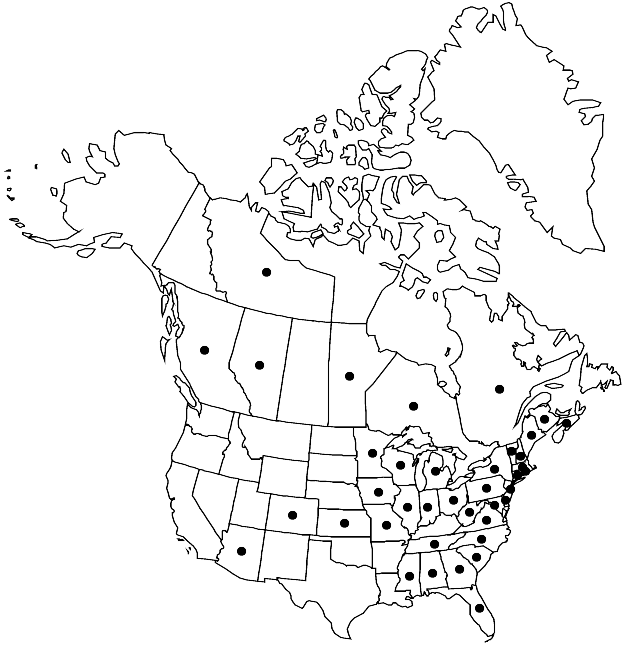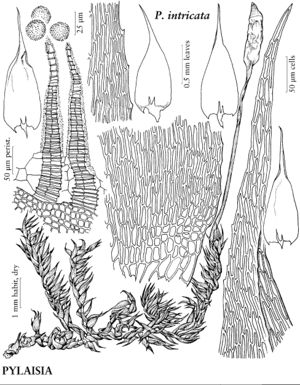Pylaisia intricata
in P. Bruch and W. P. Schimper, Bryol. Europ. 5: 88. 1851.
Plants yellowish. Stems terete-foliate, irregularly pinnate, branches 5 mm, creeping or sometimes ascending and curved, subjulaceous; pseudoparaphyllia triangular to semicircular. Stem and branch leaves differentiated. Stem leaves straight or somewhat falcate, ovate-lanceolate, suddenly narrowed to apex, concave, not plicate, 0.8–1 × 0.2–0.4 mm; margins plane; acumen short; costa double, short; alar cells 6–12 along margins, in 6–9 rows; medial laminal cells 30–65 × 5–6 µm. Branch leaves oblong-lanceolate, larger, 1.1–1.2 × 0.3–0.4 mm. Seta 2–2.4 cm. Capsule erect to suberect, oblong-cylindric, 1.8–2 × 0.6–0.7 mm; exothecial cell shape variable; operculum rostrate, obliquely long-pointed; peristome reduced; exostome teeth lanceolate, 0.2 mm, base 50 µm wide, finely papillose distally; endostome adherent to exostome teeth, basal membrane well developed, segments 2-fid, split, internal surface roughly and finely papillose, segment and cilia connate. Spores 16–32 µm.
Phenology: Capsules mature late summer–early fall.
Habitat: Trunks of broad-leaved trees
Elevation: moderate to high elevations
Distribution

Alta., B.C., Man., N.B., N.W.T., N.S., Ont., Que., Ala., Ariz., Colo., Conn., Del., D.C., Fla., Ga., Ill., Ind., Iowa, Kans., Maine, Mass., Mich., Minn., Miss., Mo., N.H., N.J., N.Y., N.C., Ohio, Pa., R.I., S.C., Tenn., Vt., Va., W.Va., Wis.
Discussion
Pylaisia intricata is a rare species endemic to the flora area. The leaves are homomallous and erect-spreading when dry, wide-spreading when moist, and cordate at the base; the distalmost annulus cells are vesiculose and deciduous. The species is characterized by rather small branch leaves, long-pointed opercula, finely papillose external surface of the distal portion of exostome teeth, and adherent endostome; it can be distinguished from P. polyantha by its adherent endostome and larger spores.
Selected References
None.
